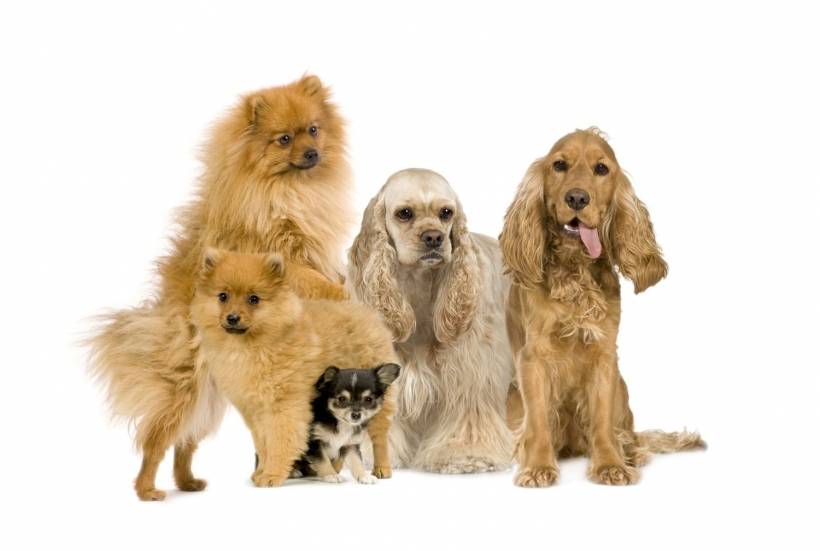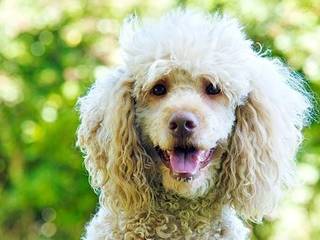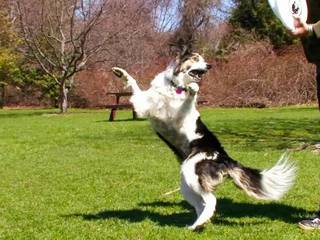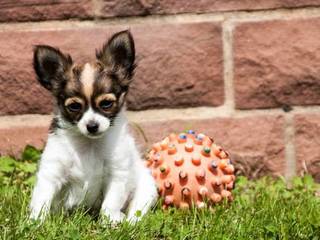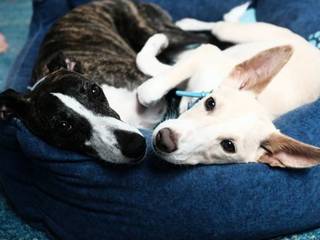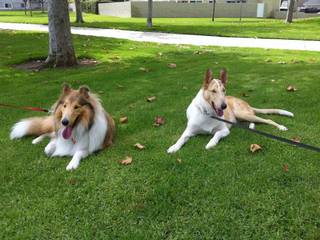Dogs have been selectively bred for thousands of years, sometimes by inbreeding dogs from the same ancestral lines, sometimes by mixing dogs from very different lines. The process continues today, resulting in a widening in appearance without speciation.
Breeds are usually categorized by the functional type from which the breed was developed. The basic types are companion dogs, guard dogs, hunting dogs, herding dogs, and working dogs; although there are many other types and subtypes.
The breed standard for each breed of dog is distinct, giving a detail of the appearance and behavior of an idealized dog of that breed. Included in the standard breed description are externally observable aspects of appearance and behavior that are considered by the breed club to be the most important for the breed and externally observable details of appearance or temperament that are considered by the breed club to be unacceptable (called faults). Also, most breed standards include a historical section, describing the place of origin and the original work done by the breed or its ancestor types.
Some of the breeds of dogs available around the world are:
Affenpinscher, Afghan hound, Airedale Terrier, Akita, Alaskan malamute, American English Coonhound, American Eskimo dog, American foxhound, American Pit Bull Terrier, American Staffordshire terrier, Basenji, Basset Hound, Beagle, Bearded Collie, Beauceron, Chihuahua, Dachshund, French Bulldog,
German Shepherd, Golden Retriever, Havana Silk Dog, Havanese, Ibizan Hound, Icelandic Sheepdog, Irish Setter, Irish Terrier, Irish Water Spaniel, Irish Wolfhound, Italian Greyhound, Jack Russell Terrier, Japanese Chin, Keeshond, Kerry Blue Terrier, Komondor, Kuvasz, Labradoodle, Labrador Retriever, Lakeland Terrie, Lhasa Apso ,Lowchen, Maltese, Manchester Terrier, Mastiff, Miniature Bull Terrier, Miniature Pinscher, Miniature Schnauzer, NAID Breed, Neapolitan Mastiff, Newfoundland, Norfolk Terrier, Norwegian Buhund, Norwegian Elkhound, Norwegian Lundehund, Norwich Terrier, Nova Scotia Duck Tolling, Old English Sheepdog, Otterhound, Papillon, Parson Russell Terrier
Pekingese, Pembroke Welsh Corgi, Peruvian Inca Orchid, Petit Basset Griffon Vendéen, Pharaoh Hound, Plott Hound, Polish Lowland, Pomeranian, Poodle – Standard, Poodle – Toy, Portuguese Podengo Pequeno, Portuguese Water Dog, Pug, Puli, Pumi, Pyrenean Shepherd, Rat Terrier, Redbone Coonhound, Rhodesian Ridgeback, Rottweiler, Saint Bernard, Saluki, Samoyed, Schipperke, Scottish Deerhound, Scottish Terrier, Sealyham Terrier, Shetland Sheepdog , Shiba Inu, Shih Tzu, Siberian Husky, Silky Terrier, Skye Terrier, Sloughi, Smooth Fox Terrier, Smooth Fox Terrier, Soft Coated Wheaten Terrier, Spinone Italiano, Springer Spaniel – English, Staffordshire Bull Terrier
Staffordshire bull terrier, Standard Schnauzer, Sussex Spaniel, Swedish Vallhund, Tibetan Mastiff, Tibetan Spaniel, Tibetan Terrier, Toy Fox Terrier, Treeing Walker Coonhound, Vizsla, Weimaraner, Welsh Springer Spaniel, Welsh Terrier, West Highland White Terrier, Whippet, Wire Fox Terrier, Wirehaired Pointing Griffon, Wirehaired Vizsla , Xoloitzcuintli, Yorkshire Terrier.
As dogs are a subspecies but their breeds are distinct genetic units, and because only certain breeds share the same type of cancers as humans, the differences in the genes of different breeds may be useful in human medical research.
Pure breed dogs have more health problems than mongrel dogs, and require more veterinary visits and tend to have lower longevity. Indeed, studies have reported shorter lifespans from between one and almost two years. Notably, dog breeds with flat faces and short noses have breathing difficulties eye trouble and other health issues. Their owners later disproportionately often abandon them. Prospective dog owners are urged to choose healthier breeds or crossbred dogs.
